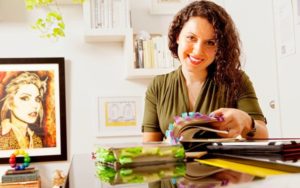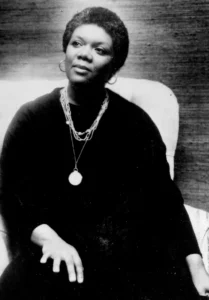Lucille Clifton on the Balance of Intellect and Intuition in Creative Work and the Healing Power of Connection
INSPIRATIONAL, 20 Nov 2023
Maria Popova | The Marginalian – TRANSCEND Media Service
How to Be a Living Poem
Every single thing we make, even the smallest, we make with the whole of who we are and what we have lived — with every impression and every memory, every love and every loss, consciously and unconsciously constellated into the creative act. A song encodes its maker’s entire history of feeling. An equation cannot describe why an apple falls without its maker’s entire understanding of how the universe works. The poetry of personhood — which we might call soul — is the raw material for all creative work. To hear its voice requires a delicate harmonizing of what we consciously know and what we unconsciously are — a syncopation of intellect and intuition.
Thinking about this in the context of Virginia Woolf’s meditation on how to hear your soul and Nick Cave’s insistence on the creative power of trusting yourself, I was reminded of some wonderful passages I had saved from various interviews Lucille Clifton (June 27, 1936–February 13, 2010) gave over the course of her long and luminous life.
A century after the polymathic Nobel laureate Henri Bergson considered the interplay of intuition and the intellect in the creative work of science, Clifton takes up the question as related to art in a Rattle magazine interview from the winter of 2002, reflecting on where a poem comes from:
You can murder poems, I mean, I’ve done it, when you start thinking too hard in your own way and you start intellectualizing, because I think a poem has to come from intellect and intuition. If you get too much intuition you have sentimentality, which is not good, and with too much intellect, it has a whole lot of stuff that nobody knows nor cares. But a poem, it’s about a whole human and speaks to the whole human and it has to come from a whole human, so you involve all of yourself.
In the final years of her life, in another interview, Clifton revisits the subject of this integrated totality of being and how to hear its voice:
A human is not sections, is not parts. Stanley Kunitz says that poetry is the story of what it means to be human in this place, at this time… If something wants to be said — the poem — the poem knows that I will accept it… You allow it in yourself. You allow it to do its work in you.
Poetry can be so healing precisely because it springs from that deepest place of reckoning with what it means to be human — the place we seek with the intellect but touch with the intuition. And down there in the depths, we don’t much differ from one another, sharing the same basic longings, the same basic fears. Clifton reflects:
Poetry can heal. Because it comes from a heart, it can speak to another heart.
[…]
Somebody asked me why is it that I want to heal the world. I want to heal Lucille Clifton! And fortunately, I am very human just like all the other ones, all the other humans.
With an eye to what it means to be a poet, she adds a sentiment equally true of any creative endeavor:
I didn’t graduate from college, which isn’t necessary to be a poet. It is only necessary to be interested in humans and to be in touch with yourself as a human.
Complement with Clifton’s classic “won’t you celebrate with me” — a living testament to this poetry of personhood turned art — and her spare, stunning ode to the common ground of being, then revisit Wendell Berry on how to be a poet and a complete human being and Anne Gilchrist — Whitman’s most beloved friend — on inner wholeness and the key to a flourishing soul.
_______________________________________
 My name is Maria Popova — a reader, a wonderer, and a lover of reality who makes sense of the world and herself through the essential inner dialogue that is the act of writing. The Marginalian (which bore the unbearable name Brain Pickings for its first 15 years) is my one-woman labor of love, exploring what it means to live a decent, inspired, substantive life of purpose and gladness. Founded in 2006 as a weekly email to seven friends, eventually brought online and now included in the Library of Congress permanent web archive, it is a record of my own becoming as a person — intellectually, creatively, spiritually, poetically — drawn from my extended marginalia on the search for meaning across literature, science, art, philosophy, and the various other tendrils of human thought and feeling. A private inquiry irradiated by the ultimate question, the great quickening of wonderment that binds us all: What is all this? (More…)
My name is Maria Popova — a reader, a wonderer, and a lover of reality who makes sense of the world and herself through the essential inner dialogue that is the act of writing. The Marginalian (which bore the unbearable name Brain Pickings for its first 15 years) is my one-woman labor of love, exploring what it means to live a decent, inspired, substantive life of purpose and gladness. Founded in 2006 as a weekly email to seven friends, eventually brought online and now included in the Library of Congress permanent web archive, it is a record of my own becoming as a person — intellectually, creatively, spiritually, poetically — drawn from my extended marginalia on the search for meaning across literature, science, art, philosophy, and the various other tendrils of human thought and feeling. A private inquiry irradiated by the ultimate question, the great quickening of wonderment that binds us all: What is all this? (More…)
Tags: Inspirational
DISCLAIMER: The statements, views and opinions expressed in pieces republished here are solely those of the authors and do not necessarily represent those of TMS. In accordance with title 17 U.S.C. section 107, this material is distributed without profit to those who have expressed a prior interest in receiving the included information for research and educational purposes. TMS has no affiliation whatsoever with the originator of this article nor is TMS endorsed or sponsored by the originator. “GO TO ORIGINAL” links are provided as a convenience to our readers and allow for verification of authenticity. However, as originating pages are often updated by their originating host sites, the versions posted may not match the versions our readers view when clicking the “GO TO ORIGINAL” links. This site contains copyrighted material the use of which has not always been specifically authorized by the copyright owner. We are making such material available in our efforts to advance understanding of environmental, political, human rights, economic, democracy, scientific, and social justice issues, etc. We believe this constitutes a ‘fair use’ of any such copyrighted material as provided for in section 107 of the US Copyright Law. In accordance with Title 17 U.S.C. Section 107, the material on this site is distributed without profit to those who have expressed a prior interest in receiving the included information for research and educational purposes. For more information go to: http://www.law.cornell.edu/uscode/17/107.shtml. If you wish to use copyrighted material from this site for purposes of your own that go beyond ‘fair use’, you must obtain permission from the copyright owner.
